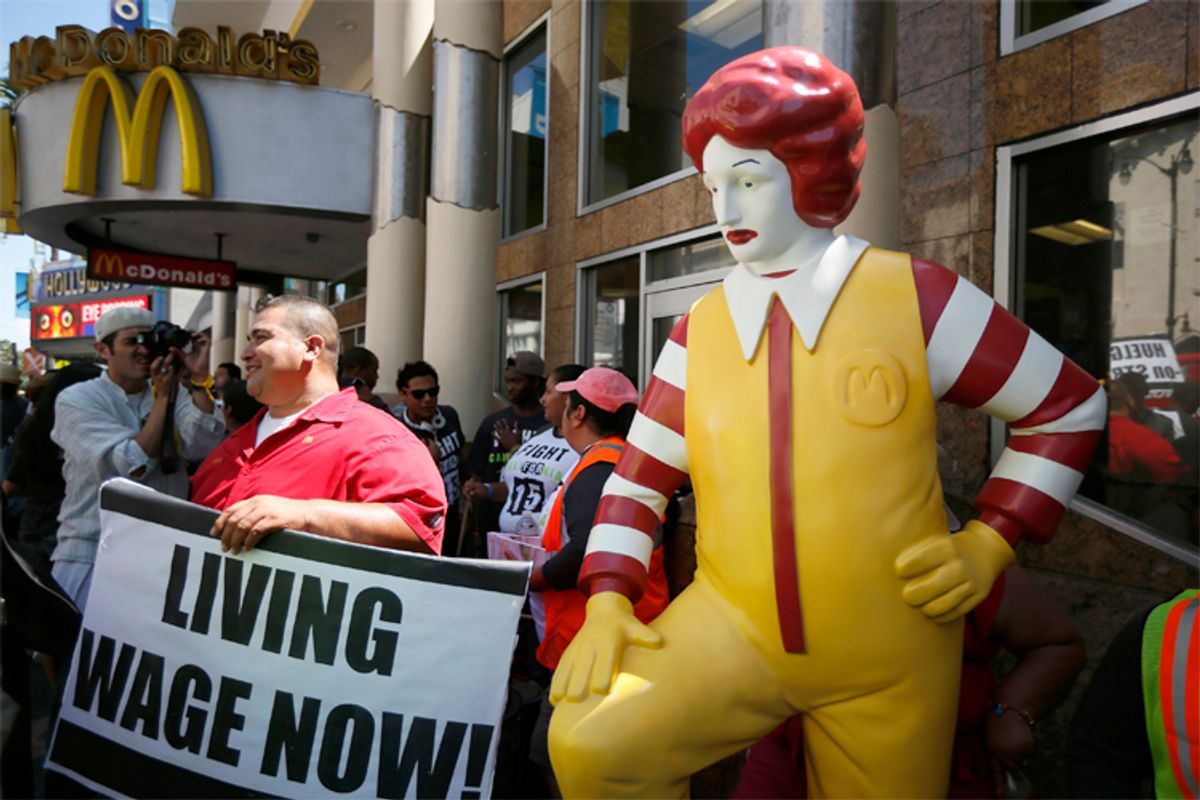An audio recording released by labor activists Wednesday afternoon captures a staffer for McDonald’s’ “McResources Line” instructing a McDonald’s worker how to apply for public assistance.
The audio – excerpted in the campaign video below – records a conversation between Chicago worker Nancy Salgado, a ten-year employee currently making the Illinois state minimum wage of $8.25, and a counselor staffing the company’s “McResources” 1-800 number for McDonald's workers. The McResources staffer offers her a number to “ask about things like food pantries” and tells her she “would most likely be eligible for SNAP benefits” which she explains are “food stamps.” After Salgado asks about “the doctor,” the staffer asks, “Did you try to get on Medicaid?” She notes it’s “health coverage for low income or no income adults and children.”
“It was really, really upsetting,” Salgado told Salon Wednesday, “knowing that McDonald’s knows that they don’t pay us enough, and we have to rely on this.” Noting that McDonald’s was “a billionaire company,” she asked, “how can they not afford to pay us?”
In the full, fifteen-minute audio, which was provided to Salon by the campaign, the McResources counselor can also be heard telling Salgado she “definitely should be able to qualify for both food stamps and heating assistance.” She tells Salgado that having food stamps “takes a lot of the pressure off how much money you spend on groceries.” She also tells Salgado she may possibly qualify for Medicaid, though “I wouldn’t want to get your hopes up.” The conversation begins with Salgado telling the counselor that she’s recording the conversation so she can share the info with her sister; it ends with the counselor suggesting Salgado urge the owner of her franchised store to pay a fee and sign up for McResources, which she says would allow McDonald’s to provide more help to employees there.
The video is the latest salvo in a union-backed effort to force a transformation in the virtually non-union fast food industry, which is increasingly prevalent in and representative of the post-crash US economy. As I’ve reported, the campaign – whose key national backer is the Service Employees International Union – has included a wave of strikes which began in New York last November, and in August escalated to a one-day sixty-city work stoppage.
The new video follows two reports released last week – one by the UC Berkeley Center for Labor Research and Education and the University of Illinois at Urbana-Champaign Department of Urban & Regional Planning, funded by the fast food campaign; and another by the pro-union National Employment Law Project – which estimated that fast food workers utilize nearly $7 billion annually in public assistance, while fast food corporations last year netted $7.4 billion profits.
After noting such stats, the campaign video’s on-screen text reads, “McDonald’s doesn’t want to pay its workers more. McDonald’s wants you to pay its workers more.” And then, “Umm, who’s on welfare? These guys” – followed by icons for McDonald’s and other top fast food chains.
The video was released hours after a DC press event in which three congressional Democrats joined members of the union-backed non-union workers group OUR Walmart to blast the retail giant for paying wages that leave workers in need of public assistance. As I reported, Congressman George Miller accused the company of undermining the purpose of welfare reform, while Congresswoman Jan Schakowsky called Walmart elites the real “welfare kings” of America. Highlighting employees’ use of public assistance was also a tactic of the union-backed mid-2000’s “air war” efforts against the company. That message was criticized at the time by Wal-Mart defender Jason Fuman, who now chairs the White House Council of Economic Advisors; he wrote in 2006 that Wal-Mart critics seemed to be “playing on the atavistic anti-welfare, anti-government, anti-tax instincts of some conservatives.”
McDonald’s did not immediately respond to a Wednesday afternoon inquiry. The National Restaurant Association last week dismissed the Berkeley-Urbana-Champaign study: its Executive Vice President Scott DeFife charged in an e-mail that “These misleading efforts use a very narrow lens and selective data to attack the industry for their own purposes and fail to recognize that the majority of lower-wage employees works part-time to supplement a family income.”
Salgado said she “of course” supports government funding for the public programs mentioned on the McResources line, but that she found it “ridiculous how fast food workers, we have to rely on our government systems,” given that “McDonald’s should be able to pay all of its employees” enough not to. While “McDonald’s is going to say what’s good for them,” charged Salgado, “it’s not only a part-time job at this point. It’s a job that we all rely on.” Salgado confronted McDonald's US CEO earlier this month when he was keynoting a Union League Club First Friday luncheon, asking him whether it was fair for her to be making the state minimum wage after a decade of service.
Salgado, who has twice joined fellow non-union fast food workers in going on strike, told Salon that “at first was very scary,” and she expected to be fired. However, she said, “after I went back with a lot of support from my union, it was really easy afterwards.”

Shares